The Rohingya Refugee Crisis
Text and photos: Britt Celine Oldebråten/ADRA
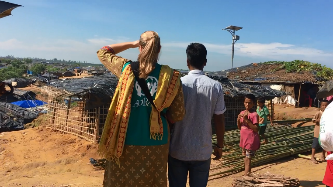 We visited the nearest refugee camp and thought that it was huge as we could not see the end of it, even as we walked deeper and deeper into the labyrinth of shelters. But when we entered the next refugee camp by car, everyone in the car went quiet and just looked through the windows. I almost could not believe my eyes: shelter after shelter on hills, in the forest – anywhere where there is space. Everywhere. And so many people. People walking on the road, sitting in every shade or waiting under the trees in the forest before they find a plot of land. I have never seen anything like this. Trees have been cut. It’s messy, it’s muddy, it’s crowded – it’s desperate.
We visited the nearest refugee camp and thought that it was huge as we could not see the end of it, even as we walked deeper and deeper into the labyrinth of shelters. But when we entered the next refugee camp by car, everyone in the car went quiet and just looked through the windows. I almost could not believe my eyes: shelter after shelter on hills, in the forest – anywhere where there is space. Everywhere. And so many people. People walking on the road, sitting in every shade or waiting under the trees in the forest before they find a plot of land. I have never seen anything like this. Trees have been cut. It’s messy, it’s muddy, it’s crowded – it’s desperate.
We continue our journey further south. Everywhere you can see refugees and shelters. ADRA has been assigned the two newest camps with refugees coming in daily. It takes almost 2.5 hours to drive from our base to get there. It is not far away but the roads are narrow and there are lots of cars and trucks and people. Someone throws relief items from a car. Then something happens. Refugees start running to get hold of something. Last week, we heard that refugees were killed because of such sloppy distributions, as the crowd was desperate to get any aid they could.
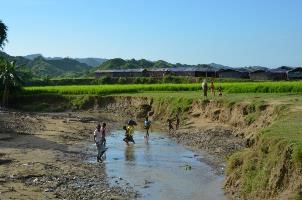 Finally, we reach our designated area. The road gets narrower. This camp looks like it has been there for a while. And it has. This was one of the first camps, and refugees in that settlement have been there for around 10 years. But new families have started to arrive, and they are trying to settle outside the existing camp. Local landowners are renting out their land to accommodate.
Finally, we reach our designated area. The road gets narrower. This camp looks like it has been there for a while. And it has. This was one of the first camps, and refugees in that settlement have been there for around 10 years. But new families have started to arrive, and they are trying to settle outside the existing camp. Local landowners are renting out their land to accommodate.
As we walked to find the new arrivals, we met people from another Non-Governmental Organization and asked them if they knew where the new arrivals were staying? “They’re over there, across the stream. But I wouldn’t put my feet in it if I was you,” they quipped.
We went a little bit further and tried to walk further along the stream to see if there was a better way to cross, but there was no other way than through the little dirty stream. So we did just that.
We were met by dreary shelters. Some had tarpaulins to cover the walls, others just had enough for the roof. Many had received some rice and a tarpaulin when they arrived, but other than that, no one had been there to help them yet.
In a shelter without walls, I found Mina and her family. There had been unrest in her village in Myanmar and the whole family was afraid, so they decided to flee to Bangladesh. “It took us three days to cross over to Bangladesh. We walked through the jungle and when we came to the river, we didn’t have any money to take the boat. But someone was kind enough to pay for us, so we managed to get over,” she said.
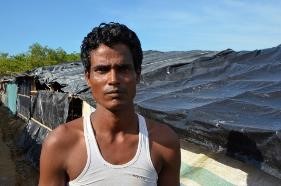 It’s been three weeks since Mina and her family left Myanmar. They have stayed in different locations before they came to this camp. “Someone gave us money so that we could buy tarps and bamboo and we got some rice from World Food Program,” says Mina. When asked about the urgent needs, Mina says: “We need shelter, food, cooking pans, water, toilet and a bridge! The most important is the shelter. Look there are no walls on this shelter. There are also not any fences around us for protection”.
It’s been three weeks since Mina and her family left Myanmar. They have stayed in different locations before they came to this camp. “Someone gave us money so that we could buy tarps and bamboo and we got some rice from World Food Program,” says Mina. When asked about the urgent needs, Mina says: “We need shelter, food, cooking pans, water, toilet and a bridge! The most important is the shelter. Look there are no walls on this shelter. There are also not any fences around us for protection”.
A man has been standing behind me listening as we interviewed the family, and approaches our translator. His name is Sajed and he wants to tell his story. We walked with him to his shelter, where his five kids are waiting for him.
“The shooting started in the morning.” he started. “Many did not have time to run from their houses.” His eyes are red and sad when he tells me: “I quickly grabbed the children and ran. In the chaos, I did not find my wife. After I had got the children to a safe place, I ran back to look for her, and I found her, but she was dead.”
We stood in silence. I looked at the five children – the youngest one around 1.5 years old and the oldest one about 7. It could not have been an easy journey for Sajed.
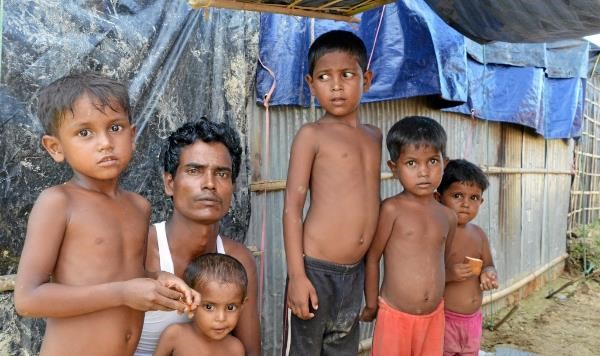 “I buried my wife. Not properly, but as well as I could under the circumstances. Then I fled with the children. We hiked over the mountains and reached the beach on the other side. We had to wait the whole night for a boat to take us across the river,” he says.
“I buried my wife. Not properly, but as well as I could under the circumstances. Then I fled with the children. We hiked over the mountains and reached the beach on the other side. We had to wait the whole night for a boat to take us across the river,” he says.
Sajed and the children have been in Bangladesh for 19 days. The last week they have been here in this camp with other newly arrived refugees. Life is tough for the family.
“Some people were able to bring some things from their homes, but I did not have the chance to bring any items. Two of my children are sick with diarrhea. I need medicine for them. We got some rice, potatoes and water one time, but it is not enough. We need more food. But even if there was a distribution, how would I be able to go there? I cannot leave my children alone,” says Sajed.
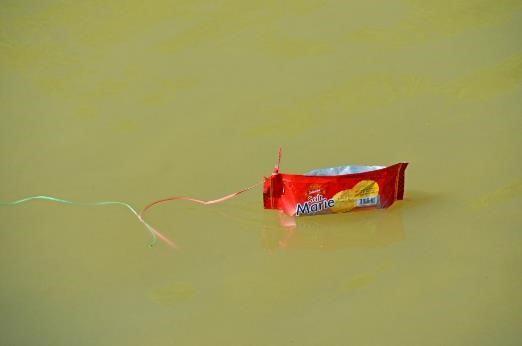 On our way, I came across a boy playing with a homemade boat when I crossed a dirty stream bare feet yesterday. I immediately thought about the Norwegian children’s song “Min båt er så liten, og havet så stort…” meaning “my boat is so little, and the ocean so big.”
On our way, I came across a boy playing with a homemade boat when I crossed a dirty stream bare feet yesterday. I immediately thought about the Norwegian children’s song “Min båt er så liten, og havet så stort…” meaning “my boat is so little, and the ocean so big.”
I felt, and still feel overwhelmed with this crisis. It is easy to become discouraged, but we have to retain hope. Even if we can’t help all, we can make life better for some, one life at a time.
Text and photos: Britt Celine Oldebråten/ADRA
Let's make a difference together!
Related News and Stories
- News Releases
- News Releases
- News Releases
- News Releases, Stories